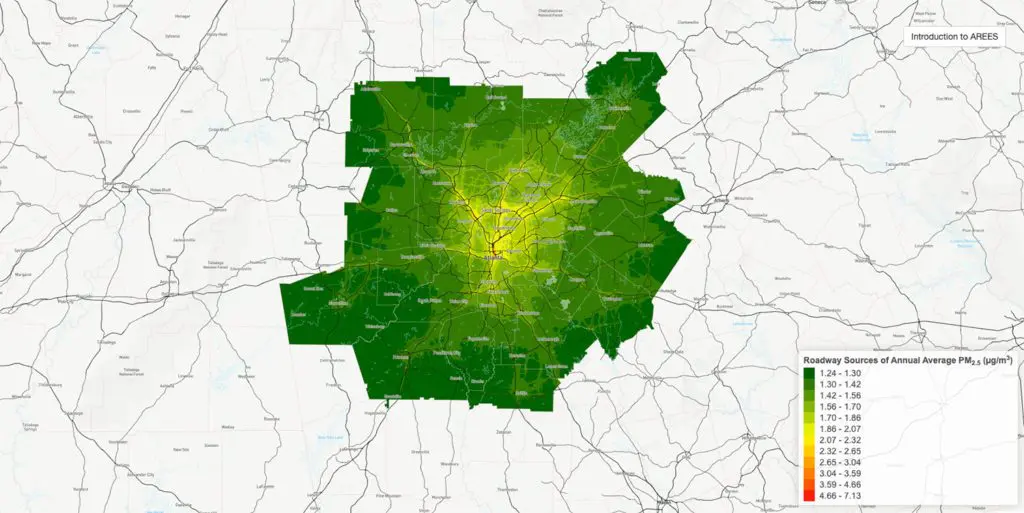This is the second blog in our series examining the impact of air pollution on our region’s health and environment. Check out the first blog, A Breath of Fresh Air, here.
Georgia’s air quality has been steadily improving for decades, thanks in large part to the Clean Air Act, a federal law that aims to control air pollution and ensure that everyone in this country has clean air to breathe. Since its passage in 1970, total emissions of the six major air pollutants in our state have dropped by 69% .
The COVID-19 pandemic has also played a role in reducing air pollution. In 2020, with companies moving to remote work and traffic decreasing by 40% on average, Metro Atlanta had a big drop in ozone pollution. For the first time in 30 years, the region met the EPA’s National Air Quality Standard for ground-level ozone.
“It goes to show how personal actions and the Clean Air Act can make a dramatic difference in our air quality,” said June Deen, Senior Director of Advocacy for the American Lung Association.
While the Atlanta region has seen some improvements in air quality over the last year, increased traffic as businesses reopen and people return to the workplace may threaten to increase air pollution.
To prevent air pollution from returning, Deen says we need to remember what we’ve learned about the benefits of driving less and making more sustainable choices in our daily lives. These small changes can add up to big benefits for our air quality and our health.
Air Pollution’s Dangerous Duo
The American Lung Association’s 2020 “State of the Air” report found Atlanta improved in the rankings for the nation’s most widespread air pollutants – ozone (smog) and particle pollution (soot). As a result, Atlanta was removed from the “Most Polluted Cities” list.
Ozone and particle pollution are dangerous to public health. Breathing in harmful gases and particles is not only linked to increases in asthma attacks, hospital admissions and death, it also increases the risk of heart attack and stroke , especially for people already living with a heart condition.
New studies by both the Harvard School of Public Health and Georgia State University also show a link between air pollution and severe cases of COVID-19, making it even more important to make sure everyone is living with healthy air to breathe.
While the region overall is doing better, there’s still work to be done. Five counties earned failing grades for high ozone days in 2020: DeKalb, Douglas, Fulton, Henry and Rockdale.
Residents in these areas are breathing less healthy air.
Deen says this is a reminder that air pollution impacts communities differently and that we should be doing everything we can to protect clean air for all, especially our most vulnerable community members.
“Everybody has a right to breathe clean air regardless of income, age, race or locality.”
– June Deen, Senior Director of Advocacy, American Lung Association
Air Quality Differences
Research by the American Lung Association shows that people with lower incomes and people of color often live closer to pollution sources, such as airports, freeways and major corridors. As a result, they breathe in poorer air quality and have worse health outcomes as a result.
A 2019 study by researchers at Georgia Tech and the University of Minnesota looked at the four largest metro Atlanta cities (City of Atlanta, Sandy Springs, Johns Creek and Roswell) and found that areas with majority Black populations had greater risk of chronic obstructive pulmonary disease (COPD), heart disease, stroke and asthma.
“Everybody has a right to breathe clean air regardless of income, age, race or locality,” Deen said. “We need to be looking at doing everything we can to keep our communities and ourselves healthy.”
Everyday Ways You Can Clear The Air
Our daily actions can directly impact our air quality. But, if you feel overwhelmed thinking about where to begin to make things better, remember: You don’t have to do everything at once. Instead, choose one small change and build from there. Here are some ideas to help get you started:
- Share the ride: Try carpooling, vanpooling or taking transit once or twice a week
- Trip chain: Combine errands into one trip to be more efficient and reduce air pollution
- Leg days: Walking or biking to neighborhood shops and restaurants is a great way to lighten the load on our environment
- Telework: Try WFH if you can. The average commute in Atlanta is 38 miles roundtrip, which means you can save 34 pounds of CO2 per commute on average!
- Car care: If you do drive, keep up on car maintenance and make sure the tires are properly inflated to reduce emissions
- Plan ahead: Get travel and transit updates so you’re less likely to get stuck in traffic
- Reduce energy consumption: A few small changes, like switching to Energy Star products, can reduce our carbon footprint
- Spread the word: Encourage regulatory agencies to set more protective pollution standards
5 Tips for Staying Safe Outdoors
The best way to protect yourself from the harmful effects of air pollution is to avoid breathing in toxic air. The American Lung Association’s Senior Director of Advocacy offers these five simple ways you can keep your heart and lungs safer:
- Check the air quality index regularly to stay up-to-date on air pollution levels in your community.
- Avoid exercise outdoors when pollution levels are high.
- Limit the amount of time children play outdoors if air quality is unhealthy.
- Avoid exercising near high traffic areas at all times, not just when air quality is poor.
- Avoid idling in the school carpool line.
For more ways to protect our air, visit Stand Up for Clean Air.
Neighborhood Level Air Pollution
For a closer look at the air quality of your neighborhood, check out The Atlanta Regional Commission’s interactive air quality map that shows community exposure to air pollution throughout the 20-county region. The map focuses on particulate matter air pollution resulting from the transportation system. Many neighborhoods—especially those near industrial plants and areas of high traffic—are hot spots for toxic air.

Source: Atlanta Regional Commission
